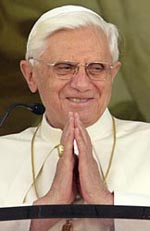In fact, he said, when people cannot see their own need for forgiveness, they cannot forgive others, so they create a culture where people turn immediately to a court to assign blame.
The fact that people sin against God and against each other “is part of the truth about the human person,” the Pope said in an Oct. 9 speech to bishops from British Columbia, Alberta, Saskatchewan and Manitoba. The church leaders were in Rome for their ad limina visits, which bishops make to the Vatican every five years to report on the status of their dioceses.
Pope Benedict said he was pleased by the bishops’ reports on efforts to promote the sacrament of Reconciliation within their dioceses.
“While this sacrament is often considered with indifference, what it effects is precisely the fullness of healing for which we long,” the Pope said.
Using the parable of the prodigal son, Pope Benedict spoke of God’s endless mercy and the human desire for forgiveness and reconciliation. As in the parable, he said, “the human temptation to exercise one’s freedom by distancing oneself from God is frequent.” But as demonstrated by the fate of the younger son who takes his inheritance and leaves his father, the Pope said, when freedom is sought without reference to God “the result is negative: loss of personal dignity, moral confusion and social disintegration.”
The older, obedient son’s reaction also is erroneous, the Pope said; it is similar to that of many people “who sadly distance themselves from the church” because they are unable to understand God’s unconditional love.”
A person has to recognize his own sinfulness before he can ask forgiveness and before he can grant others pardon.
“When the need to seek forgiveness and the readiness to forgive are forgotten, in their place a disturbing culture of blame and litigiousness arises,” the Pope said.
The Pope praised the work of the Catholic Aboriginal Council for Reconciliation and the Amerindian Fund for their efforts to redress the injustices of the past, and he encouraged the church to address “the underlying causes of the difficulties surrounding the social and spiritual needs of the aboriginal faithful.”
Sinfulness can lead to culture of blame
By Cindy Wooden, Catholic News Service VATICAN CITY - When individuals lose sight of their own sinfulness, it is impossible to promote real reconciliation and establish true justice in society, Pope Benedict XVI told bishops from Western Canada.
VATICAN CITY - When individuals lose sight of their own sinfulness, it is impossible to promote real reconciliation and establish true justice in society, Pope Benedict XVI told bishops from Western Canada.Please support The Catholic Register
Unlike many media companies, The Catholic Register has never charged readers for access to the news and information on our website. We want to keep our award-winning journalism as widely available as possible. But we need your help.
For more than 125 years, The Register has been a trusted source of faith-based journalism. By making even a small donation you help ensure our future as an important voice in the Catholic Church. If you support the mission of Catholic journalism, please donate today. Thank you.
DONATE
